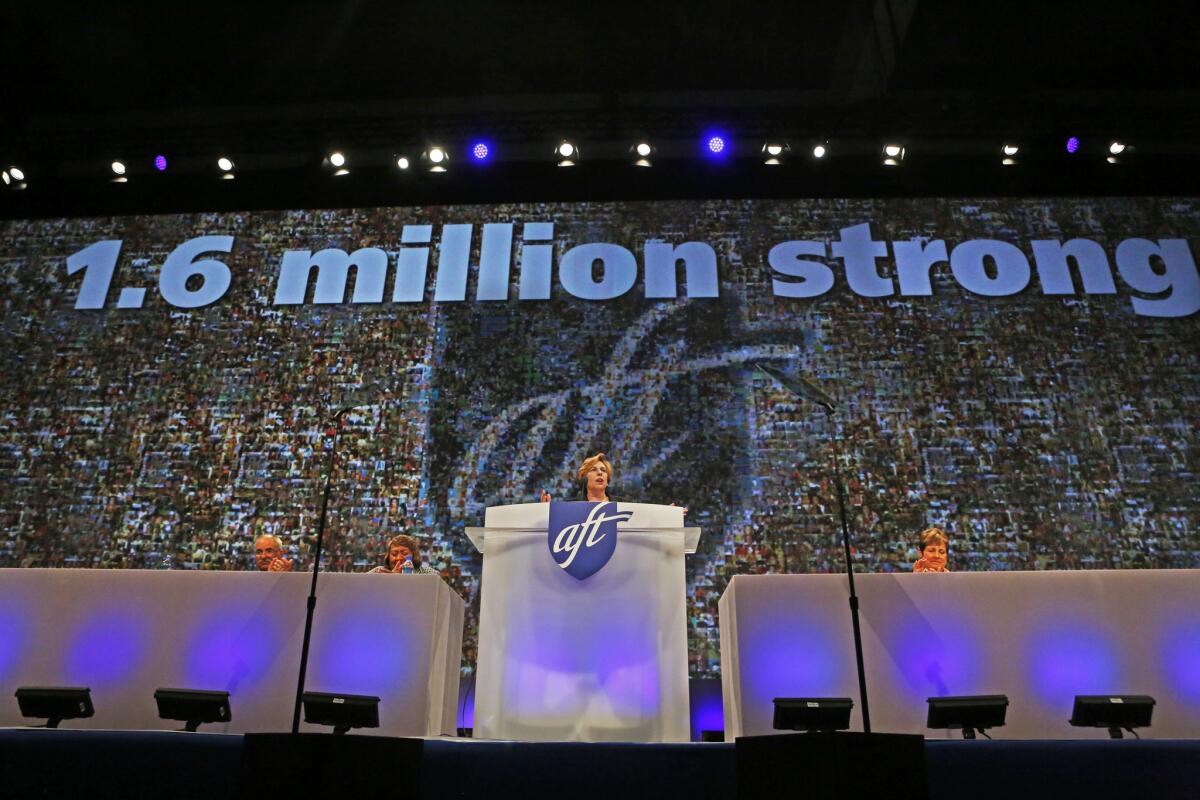A U.S. judge blocks the latest attack on teachers’ political speech

Randi Weingarten, president of the American Federation of Teachers--one of the defendants in the Bain lawsuit--speaks before the AFT 2014 convention in Los Angeles in July.
- Share via
The lawsuit known as Bain v. California Federation of Teachers always had a Lewis Carroll flavor.
As we reported in May, it was an attack on the collective voice of teachers masquerading as a defense of free speech. A complaint about teachers being excluded from their unions’ policy discussions, with two union officials among the plaintiffs. And a purported defense of the rights of students, bankrolled by rich hedge fund managers and the Walton family.
On Wednesday the lawsuit, which named the CFT and five other local and national teachers unions, was tossed out of court by U.S. District Judge Stephen V. Wilson of Los Angeles. Wilson gave the plaintiffs 30 days to file an amended complaint. A spokesman for StudentsFirst, the organization bringing the suit, said it would proceed.
The group’s prime target is the “agency” or “fair share” fee. Under the law and according to a 1977 Supreme Court decision known as Abood, public workers can’t be compelled to join a union and therefore support its political activities with their dues. But because public worker unions are required to represent all workers in contract negotiations and enforcements, non-members can be assessed fees to cover solely the cost of those activities. That’s the arrangement in California.
The Bain case is part of a continuum of efforts to stifle the voice of teachers--indeed, all public employees--in politics. These have included Gov. Arnold Schwarzenegger’s 2005 ballot initiatives to reduce teacher tenure rights and hamstring public employee unions’ authority to spend member dues on political activity. Both failed. The U.S. Supreme Court will hear another effort from California to get Abood overturned, Friedrichs vs. California Teachers Assn., in the coming term.
The Bain plaintiffs maintain that even the agency fee system coerces them to support political positions they don’t accept. That’s because union membership provides so many benefits that they lose too much by remaining non-members, the only condition under which they can avoid supporting union political stances with their dues.
Essentially, they want to have membership benefits without membership obligations. Their claim in court was that since the unions have contracts with public entities, they’re effectively and unconstitutionally being denied their 1st Amendment free speech rights by government action.
As Judge Wilson distilled their argument: “If they accept the speech restrictions imposed by union membership, they receive significant employment-related benefits and voting rights....If they choose to leave the union, they will lose those benefits and voting rights. In Plaintiffs’ view, this is a Hobson’s choice.” That is, no real choice at all.
Wilson didn’t buy the argument that this amounted to illegal coercion. He observed that contributing to unions’ political activities was a condition of membership, not a condition of employment, which kept it within the law. The plaintiffs couldn’t show that there was any conspiracy between government and the unions to coerce their donations and their support.
Indeed, as we observed earlier, it’s absurd for the plaintiffs to say their voices on union policy or politics would be suppressed. As members, they would have the right to vote on those policies or for or against the officers who implemented them. If they wanted even greater influence, they could seek union office--as two of the four plaintiffs did.
Moreover, at least one of the plaintiffs, Bhavini Bhakta, acknowledged in an interview that she didn’t object to her union’s political activity itself, just to the actual political position it held. That implies that what the plaintiffs were asserting wasn’t the right of free speech itself, but the right to be always in the majority. And no one is entitled to that.
Keep to date with the Economy Hub. Follow @hiltzikm on Twitter, see our Facebook page, or email michael.hiltzik@latimes.com.
More to Read
Inside the business of entertainment
The Wide Shot brings you news, analysis and insights on everything from streaming wars to production — and what it all means for the future.
You may occasionally receive promotional content from the Los Angeles Times.











